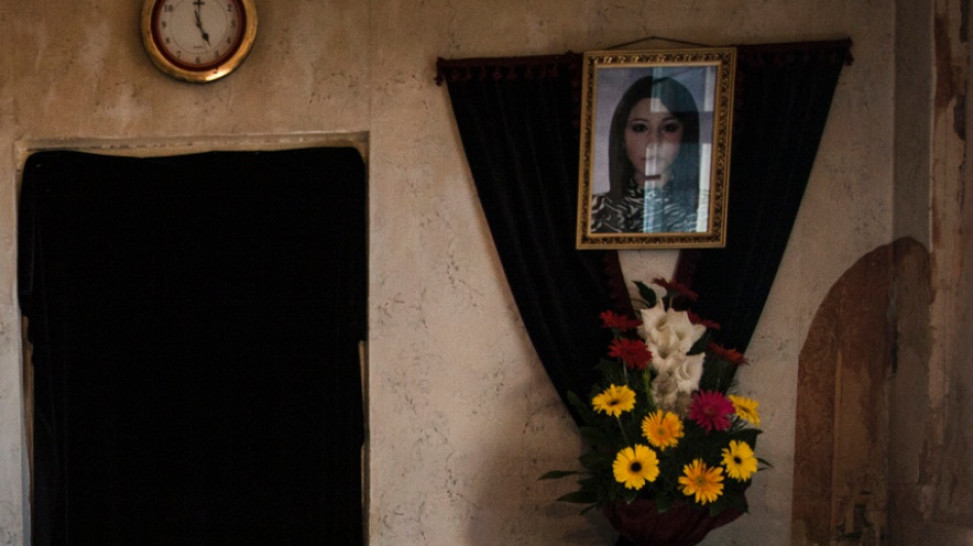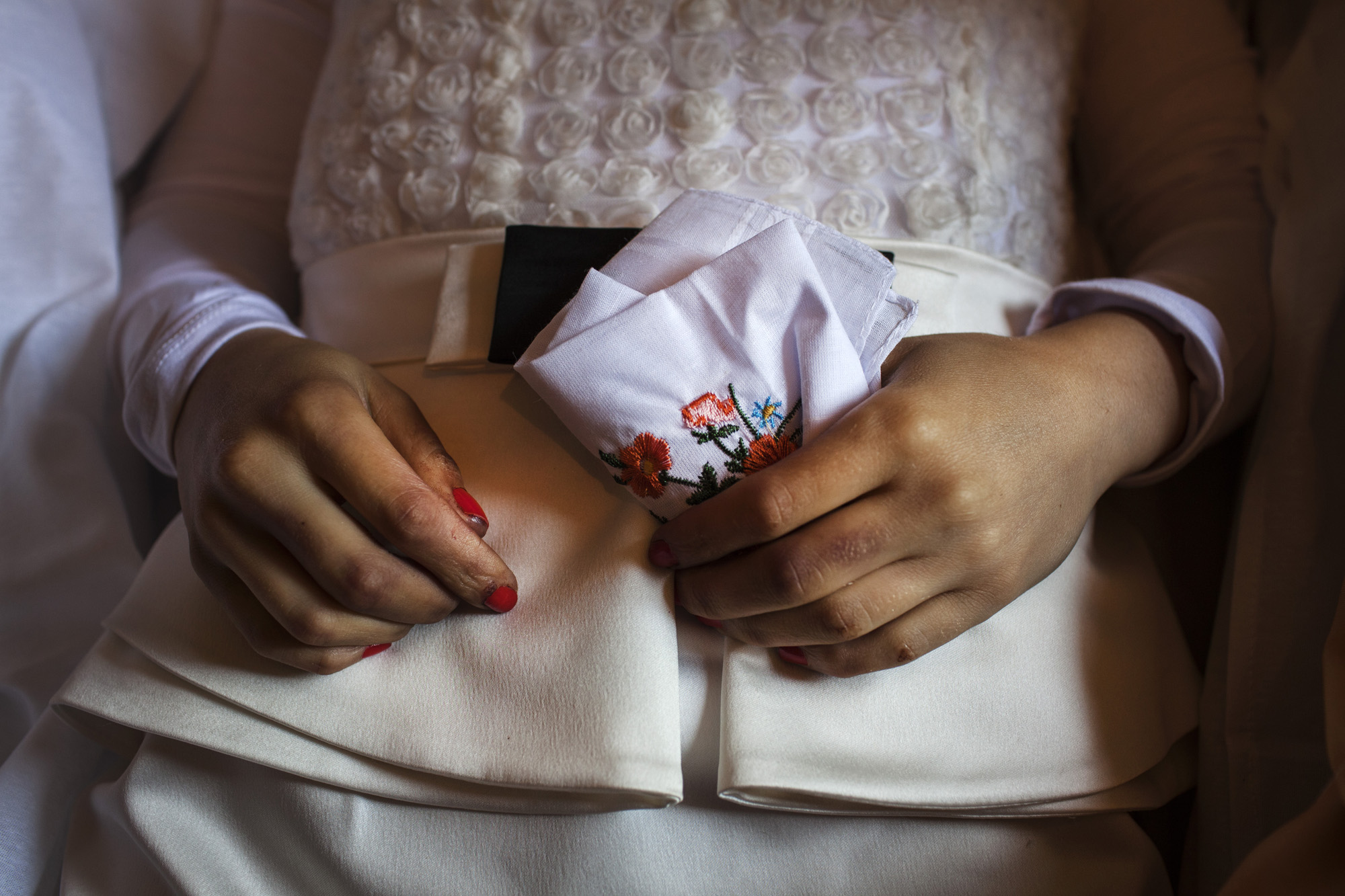 Family Still Doesn't Believe Daughter Committed Suicide
Family Still Doesn't Believe Daughter Committed Suicide
by Mariam Yeghiazaryan
For over six years, Maro Guloyan’s supposed suicide case has been bouncing around the Armenian judicial system.
Guloyan was found on July 12, 2012, hanging in the shower with a housecoat belt. She was 20 years old.
Neither a preliminary investigation nor investigative expertise provided essential facts on whether her death was a suicide or femicide. The case was filed three years ago with the European Court of Human Rights, which has a huge backlog. The family says it has more faith in getting justice themselves, or in heavenly justice, than in any legal system.
Even by stopping at almost every house in the village of Byureghavan, approximately 20 km far from Yerevan in the Kotayk region, it was almost impossible to find anyone who knew how to find Yeritasardakan Street. Finally a women distributing social funds pointed the way.
"They killed the poor young girl, and no one took responsibility," she murmured.
The house where Guloyan lived before marriage is more like a cottage. After opening the gate, her 74-year-old father Romelse Tovmasyan led the way into the living room without even asking who was visiting or why.
Heavy melancholic music, known in Armneia as rabiz or mugham, was playing. Guloyan’s twin brother, 28-year-old Mher Tovmasyan, was eating. His mother, 57-year-old Nina Hambardzumyan, was doing housework. Showing both skepticism and despair, she agreed to speak only if there no video was shot.
“Thousands like you came, shot, and talked. Nothing has changed,” she said.
She cleaned part of the table while her son kept eating.
She said her daughter was a lively and intelligent child. There was an older brother in addition to her twin. After graduating from school she studied hairdressing, and worked in Abovyan, a city six kilometers away.
She met her husband Gevorg, now 32, through a friend of his who lives nearby.
"Gevorg told this guy that he was looking for a good, decent girl to marry, so he showed her Maro," her mother said. "Gevorg was told that Maro came from a moral family, had brothers, and modest parents. So he approached her."
Hambardzumyan emphasized that they raised their daughter according to Armenian traditional principles.
"We always told her not to have chats with the guys in the street. Once she came and said that Gevorg approached her, but she refused to talk to him. Then he came to my husband and asked permission to date Maro, to find out whether they were a match for each other. My husband told him that Maro is not a guttersnipe, and if they wanted to meet, they could do it inside the house or in the garden, not outside."
She said her husband was against the marriage from the very beginning, and Gevorg understood it clearly.
“They dated for five months. My husband used to tell Maro that they were not a match for each other, as she was raised in the village according to rural customs, while her husband was raised in an urban area.
"One day Maro went to Gevorg's house and did not come back. She said she had to take care of Gevorg. When we realized that she had run away, we went and talked to Gevorg's relatives. We were told that they did not bring our daughter to their house only for her to return later, so she had to stay.
So Maro settled into her new home, 13 kilometers away.
"They did not have a wedding, but we celebrated Trndez (Armenian word for the celebration of Iranian festival Chaharshanbe Suri. Lovers jump over a fire, believing it will strengthen them to overcome all difficulties together. Newlyweds' families celebrate the holiday with extra joy.)
In 2010, they officially recorded their marriage before the birth of their baby.
Hambardzumyan said the only bad habit Gevorg had was gambling. He did not have a permanent job, but worked at a gas station. She said her daughter never complained.
“We did not rely on Gevorg," her mother said. "He did not have to support her alone. We supported them in every way.
"Did a black cat pass them? What happened?”

As the conversation started to touch the day of her daughter's death, the noise from the kitchen arose.
“It was apricot harvest season. I went to the fields, leaving my phone at the house, as it had no battery charge. Maro called me that day, but could not reach. She also talked to her father, brother, our neighbor. She spoke the same as usual. When my husband asked whether everything was fine, she said she only wanted to talk with me. Then she called her brother.”
After that phone call, her twin went to her house talk to her and her husband about their marital situation and child.
At this point in the conversation, Mher started shouting not to record anymore.
“Why do you keep telling this story! Has anything been changed! Why there is a need to say it all again! Everything should have been done at that time. It was not done. That’s it. They wanted to conduct a trial without police (evidence)."
The audio recorder was switched off.
On July 12, 2012, police received an alert from the Abovyan Medical Center that Arinj district resident Maro Guloyan had hung herself in the family shower using the belt of her housecoat at around 7 pm.
Although Armenian courts viewed the case as a suicide because of a lack of evidence to prove otherwise, Maro's family and human rights activists, led by the Women's Resource Center Armenia, insist that it is a femicide case.
Lusine Minasyan, legal representative for the victim's father, says contradictions start with the official record of the incident. Gevorg's uncle's wife Armine Grigoryan gave two different witness testimonies, changing the time and the manner and sequence of her actions after she found Maro’s body in the bathroom.
“The court did not try to find out from the witness (Armine Grigoryan) why she testified one time that it happened at around 19:00 pm, and testified another time that it was around 16:00 pm," Minasayn said. "According to her first testimony, she was the one to cut down Maro’s body; in another court, she said her daughter did it.
"In her first testimony, the witness said she cut the belt and lowered the body. However, during a (later) police investigation at the scene, the witness was unable to lower a doll made to imitate the body.
"Then the witness changed her testimony, saying she had not hugged Maro, but kneeled down, and Maro's body fell on her. But no such injuries from such a fall were found on Maro’s body.”
Nobody testified that her husband was in the home at the time. A forensic examination found some alcohol in the victim's blood. The reasons and circumstances for this have not been described during either the investigation or the court hearings.
The belt used in the hanging seems to be missing. No photos from the autopsy have been attached to the primary medical forensic examination conclusion.
“The forensic expert in this case, Arthur Minasyan, said the film taken of the corpse was overexposed during developing, and the photos were destroyed. How can we be sure that this is not an accident, but intentional?” said Lusine Minasyan.
Anahit Hayrapetyan, an independent journalist who photographed Maro's funeral for her "From Princess to Slave” project covering domestic violence and femicide in Armenia, says her photos document signs of violence on Maro's hands and neck which, according to Lusine Minasyan, show that the victim had been subjected to violence.
Even a hypothesis that she was drowned by her husband was discussed. In December 2012 at the request of her family, Maro's corpse was exhumed.
“When the exhumation was finally made, months had passed and the examination of the corpse did not prove that the preliminary investigation did not clarify a lot,” the lawyer Minasyan said.
The lawyer Minasyan, said Maro was constantly subjected to violence by her husband. According to Minasyan, Maro regularly threatened to get a divorce, but did not, because her husband threatened to take away their child. At the time of her death, Maro was early in another pregnancy.
The Kotayk Investigation Department initiated criminal case #20113912 under the second part of the 110th article of the Criminal Code ― leading to a suicide. The law states that an offense committed against a person who is materially or otherwise dependent on a criminal is punished with imprisonment for a term of up to five years.
That hasn't happened yet. On April 22, 2013, the Kotayk Criminal Division decided to terminate the criminal proceedings due to lack of evidence.
On June 24, 2013, that decision was overturned by the General Prosecutor. In August of 2013, the case was transferred from Kotayk to the capital city of Yerevan’s Nor Nork district investigative department. Minasyan said she made numerous requests for the transfer because the husband's family is related to Murad Guloyan, a former parliamentarian with "Prosperous Armenia", the strongest political party in that region.
The case passed through the Armenian justice system all the way to the Supreme Court, where it was still ruled a suicide.
In 2015, the victim's father applied to the European Court for Human Rights (ECHR). The complaint has been filed on the basis of three articles: 2nd -- Right to Life; 6th -- Right to Fair Trial; and 8th -- Right to Respect for Private and Family Life.
The ECHR ruled on 103 Armenian cases between 1959-2018. Three cases involved right to life, 38 cases involved right to fair trial, and two cases involved right to respect for private and family life.
The lawyer Minasyan says there is no news from the ECHR on Maro's case.
Maro's daughter is now 9 years old and lives with her father. Maro's parents regularly see their grandchild and she comes to their home for holidays.
“I took all of Maro’s photos from the walls of our house. My grandchild asks me where her mother is? I take her to the grave and then point to the sky,” Maro's mother whispered at the end of our conversation.